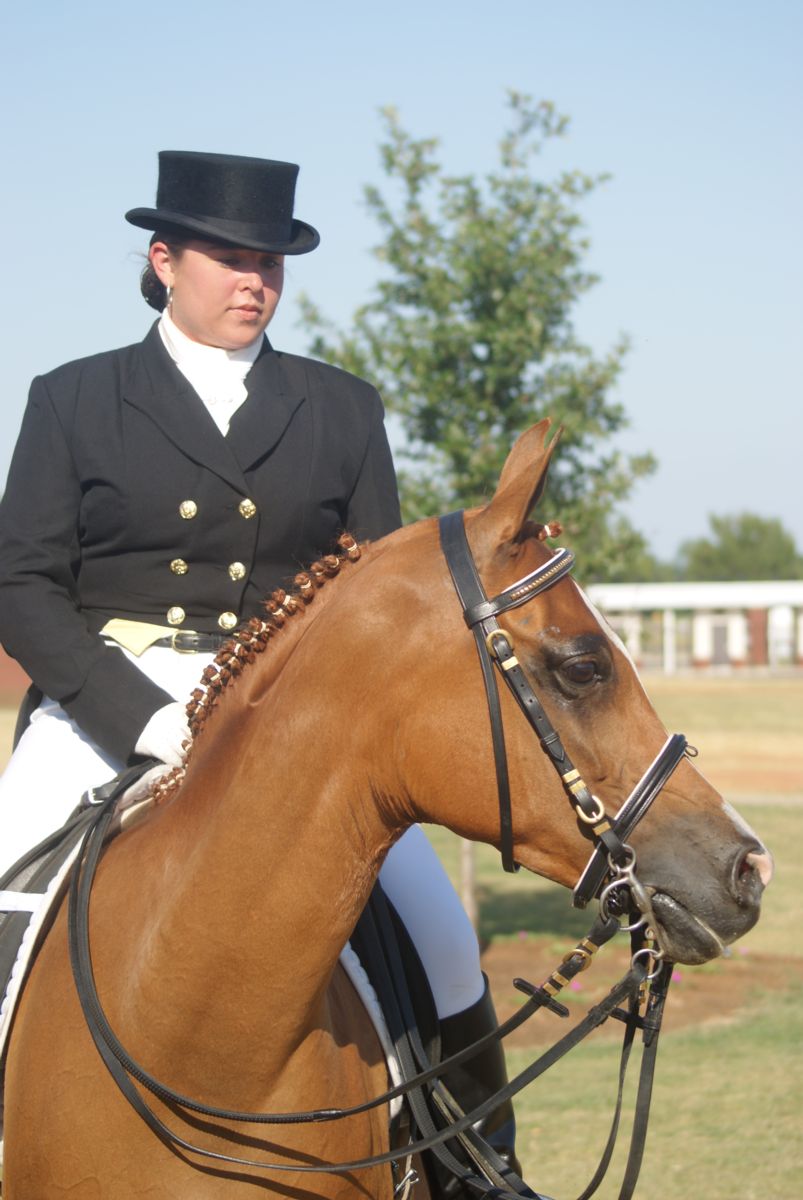GFB News Magazine
GFB Young Farmers & Ranchers Award Programs successful despite 2020 challenges
Posted on November 16, 2020 12:00 AM
By Jay Stone & Jennifer Whittaker
Like most things in 2020, Georgia Farm Bureau’s Young Farmers & Ranchers contests were held virtually this year due to COVID-19.
“Although Georgia Farm Bureau canceled our annual Young Farmers & Ranchers Summer Leadership Conference to protect the health of our members and staff based on Centers for Disease Control & Prevention recommendations for large events, it was important to hold our YF&R contests to recognize the young people who are the future of Georgia agriculture because they haven’t stopped farming or advocating for agriculture during the pandemic,” said GFB President Gerald Long.
GFB’s Discussion Meet was the contest most affected by going virtual. Contestants were asked to submit videos of themselves addressing two questions for the first and second rounds of competition. In the third round, 12 contestants competed via Zoom in four groups of three. The winners of the four discussion groups – Newt Gilman, Sarah Nerswick, Willie Sizemore and Ashley Yopp - advanced to the final round held Oct. 15 via Zoom.
For the Excellence in Agriculture Award, as in past years, a panel of judges reviewed all applications submitted to select the top three contestants – Melissa Mathis, Jesse Patrick and Ashley White. On Oct. 1, these contestants delivered 25-minute PowerPoint presentations via Zoom that outlined their ag careers, Farm Bureau activities and ag advocacy efforts.
The Achievement Award was judged solely on contents of the competitors’ applications. No on-farm interviews were held this year. Mathew & Chelsea Bohannon, Steven & Tara Green and Jacob & Emily Nolan were the top three finalists.
Congratulations to Mathis, the Nolans and Yopp for winning their respective contests! You’ll meet them and the other finalists of each contest in the following pages.
GFB’s state winners will compete for national honors in their respective 2021 American Farm Bureau Federation Achievement, Discussion Meet and Excellence in Agriculture contests, which will be held virtually in January.
AFBF YF&R Prizes
The top four competitors in the AFBF YF&R Achievement Award, Discussion Meet & Excellence in Agriculture contests will receive:
The national winners of each AFBF contest will receive a new Ford vehicle (up to a value of $35,000) and paid registration to the Farm Bureau FUSION Conference in Portland, Oregon, courtesy of Ford. The national second place winner of each contest receives a Case IH Farmall 50A, courtesy of Case IH. The national third place winner of each contest earns a Case IH 40” combination roll cabinet & top chest and $500 Case IH parts card, courtesy of Case IH, a $2,500 Investing in Your Future cash prize, courtesy of American Farm Bureau Insurance Services, Inc. (AFBIS) plus $1,850 worth of Stanley Black & Decker merchandise (PROTO, DeWalt, Stanley, Lenox & Irwin), courtesy of Stanley Black & Decker. The national fourth place winners get a Case IH 40” combination roll cabinet & top chest and a $500 Case IH parts card, courtesy of Case IH.
Yopp wins 2020 GFB YF&R Discussion Meet
Dr. Ashley Yopp of Tift County won the 2020 Georgia Farm Bureau Young Farmers & Ranchers Discussion meet, which was held virtually due to the COVID-19 pandemic. This competition is designed to mimic a committee meeting in which individuals seek solutions to specific issues.
During the Final Four round held via Zoom Oct. 15, Yopp, Newt Gilman of Jackson County, Sarah Nerswick of North Fulton County and Willie Sizemore of Lee County discussed how the vibrancy and economic sustainability of rural communities could be enhanced.
Yopp, an assistant professor of agricultural leadership, education and communications at UGA’s Tifton Campus, won the top prize of $500 and a John Deere two-seat ATV with trailer, sponsored by Southern Farm Bureau Life Insurance. She will compete in the 2021 AFBF Discussion Meet, which will be held virtually in January. The three runners-up received $350 cash courtesy of GFB.
Sizemore, a UGA senior who is studying agricultural communications, was the top collegiate finisher in the discussion meet and advances to the AFBF Collegiate Discussion Meet, planned for March at the AFBF FUSION Conference in Portland, Oregon.
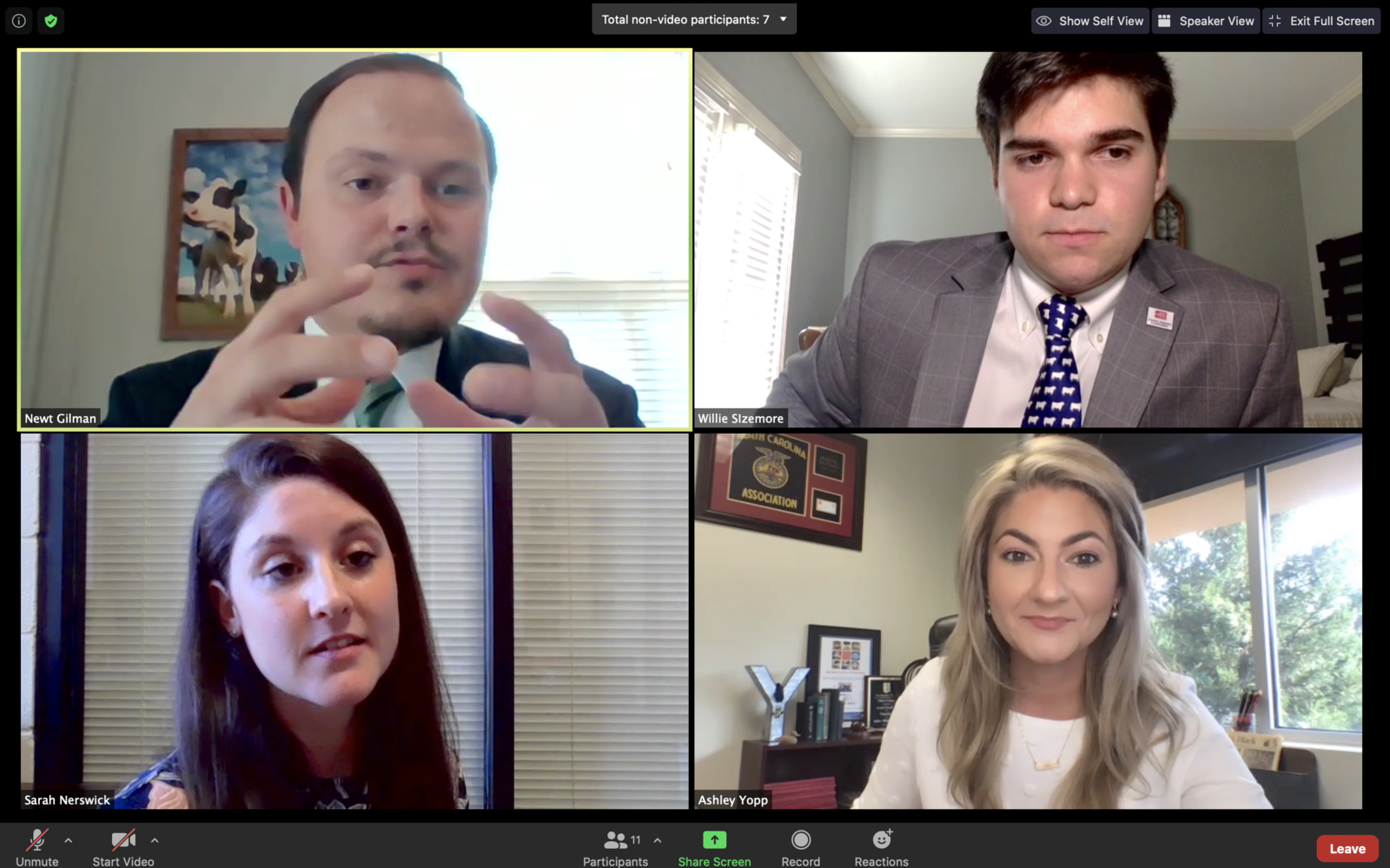
Georgia Farm Bureau held the final round of its annual Young Farmers & Ranchers Discussion Meet Oct. 15 via Zoom. Pictured clockwise from upper left, Final Four competitors were: Newt Gilman, Willie Sizemore, Dr. Ashley Yopp and Sarah Nerswick.
photo by Jay Stone
Gilman, a Jackson County Farm Bureau member, works with the USDA’s Farm Service Agency loan division in Putnam County. He is an alum of Abraham Baldwin Agricultural College and volunteers with local 4-H chapters.
Nerswick, a Maryland native and UGA alumna, is an agriculture teacher/FFA advisor at Cambridge High School. She serves as chairwoman of the North Fulton County Farm Bureau Legislative Committee and produces the Ag Teacher How-To’s blog, where she explores topics to help fellow ag teachers improve.
The GFB YF&R Discussion Meet consisted of four rounds. For the first two rounds, competitors submitted videos by Oct. 12 in which they addressed two questions. The first-round topic was how to improve rural broadband access. The second round focused on enhancing and expanding international trade.
In the third round, on Oct. 14, the 12 competitors met on Zoom in four randomly assigned groups of three. During this round, contestants discussed how farmers can ensure they have a clear understanding of the risks and rewards that accompany using big data. The winners of the four groups advanced to the final four.
Yopp, a North Carolina native, said the YF&R Discussion Meet offers a chance to have dialogue that can help farmers find approaches to overcoming the challenges they face.
“I really love being the connector piece between people or ideas and solutions. I feel like that’s where discussion meet really shines,” Yopp said. “It lets you facilitate those types of conversations to really get at great solutions or at least great ideas to help move us forward.”
Mathis wins YF&R Excellence in Agriculture Award
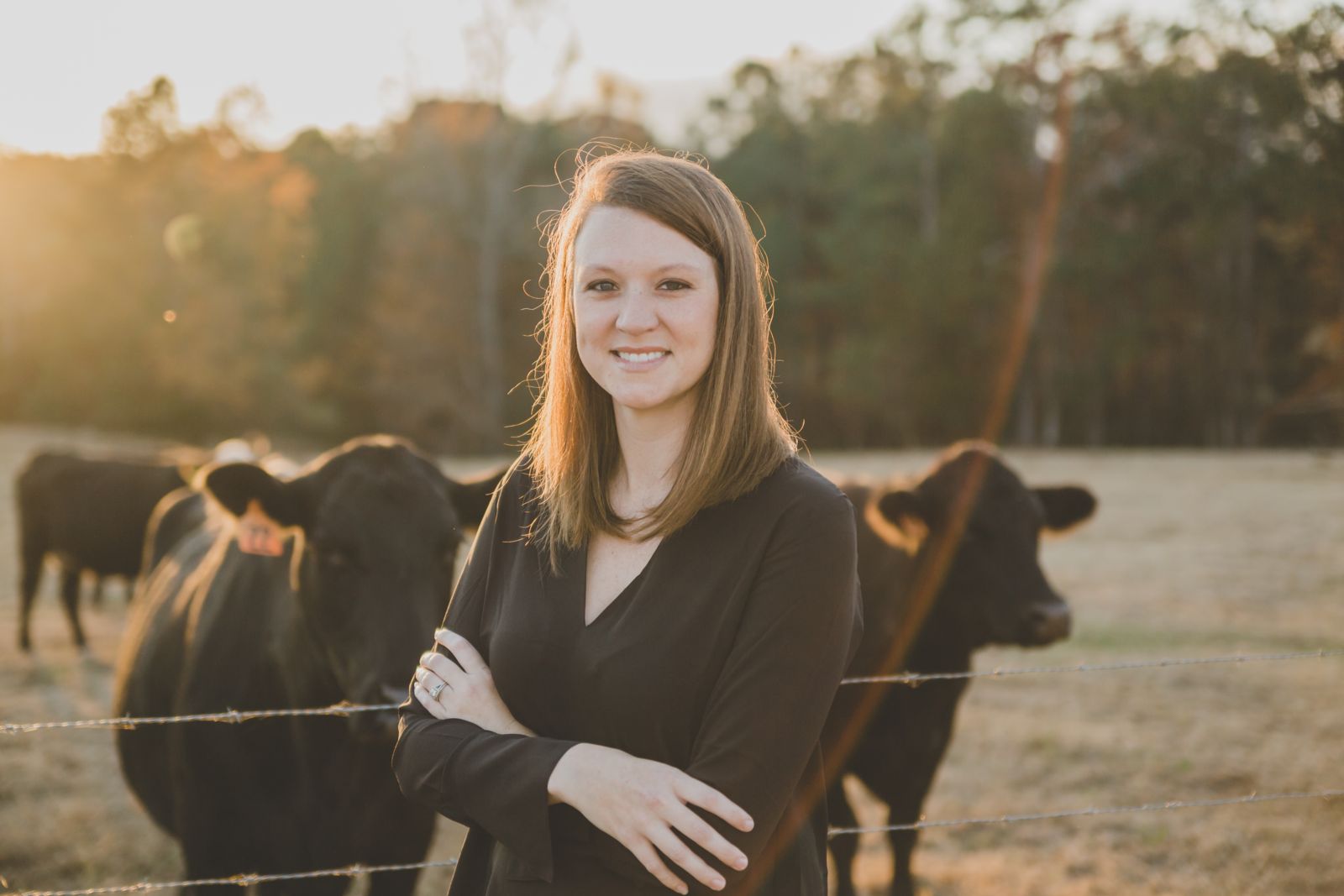
Melissa Mathis owns three farm & feed stores and raises cattle.
photo courtesy of Jenny Yoo Photography
Monroe County’s Melissa Mathis won the competition for the Georgia Farm Bureau Young Farmers & Ranchers Excellence in Agriculture Award. This award recognizes ag professionals - who earn most of their income from off-farm jobs – for their Farm Bureau involvement and ag advocacy efforts.
Mathis and fellow finalists Jesse Patrick of Putnam County and Ashley White of North Fulton County gave their presentations to judges via Zoom on Oct. 1.
As the state winner, Mathis receives a $500 award and a two-seat John Deere ATV with trailer sponsored by Southern Farm Bureau Life Insurance. Patrick and White each receive $500 cash sponsored by GFB.
Applicants for this award are asked to identify and discuss issues affecting agriculture. Mathis, Patrick and White recently shared the ag issues they’re most concerned about.
MATHIS: Farmland should be preserved
Melissa Mathis promotes agriculture in hopes of preserving the way of life that has been in her family for at least five generations.
“It’s a completely different way of doing things, the values and what we teach them on the farm,” said Mathis, who serves as vice president for Monroe County Farm Bureau while operating farm supply stores in Barnesville, Monticello and Bolingbroke. “It’s hard work, providing for yourself and that independent part of what that teaches you.”
Mathis, who also runs a 65-acre cattle farm with her husband, Bobby, has worked extensively to educate her community about the importance of agriculture, but her effort faces a growing challenge: access to land.
Monroe County is between metro Atlanta and Macon-Bibb County. Growth of both of these areas is pushing real estate development in Monroe, putting a squeeze on farmland in the county.
“All the land is being bought up by developers and it’s being turned into residential neighborhoods or industry,” Mathis said.
To counter this issue, Mathis works to inform local policymakers how important agriculture is to the local economy. According to the UGA Center for Agribusiness & Economic Development, Monroe farmers sold more than $48 million worth of products in 2018. Mathis thinks an option to curb loss of farmland may be requiring municipalities to implement local farmland conservation ordinances to qualify for some types of state funding, a practice that other states have put in place.
“I would move toward something like that to be able to continue to preserve our land, we’ve got to be able to work with our local governments to help strengthen that support,” Mathis said.
PATRICK: Access to land a hurdle for young farmers
Jesse Patrick grew up in an ag family. When his grandfather, Fred Sease, promoted farming to community members, Patrick paid attention.
“He told me growing up that if you don’t tell your story, somebody else is going to tell it and probably paint a different picture.,” said Patrick, who serves as president of Putnam County Farm Bureau.
One of the stories Patrick tells these days is the difficulty young or beginning farmers have entering the profession, in large part due to the cost of purchasing land.
“You’ve basically got to have either family land or an older farmer who’s willing for you to take over and lease it for a while, before you can buy it,” he said.
Patrick said land prices in Putnam range from $8,000 to $10,000 per acre. This complicates matters for young farmers who often have to work off-farm jobs to survive financially. Patrick works alongside his dad, veterinarian Dr. Bob Patrick, operating Southeast Ag Services, a dairy equipment sales and installation business. They also farm together, growing 100 acres of hay and keeping a herd of about 150 beef cattle.
Patrick and his wife, Brighton, have started their own livestock operation.
“I rent all of our pastureland because I can’t afford to pay for any kind of land base that I need,” Patrick said. “Renting limits me on how big of an operation I can run.”
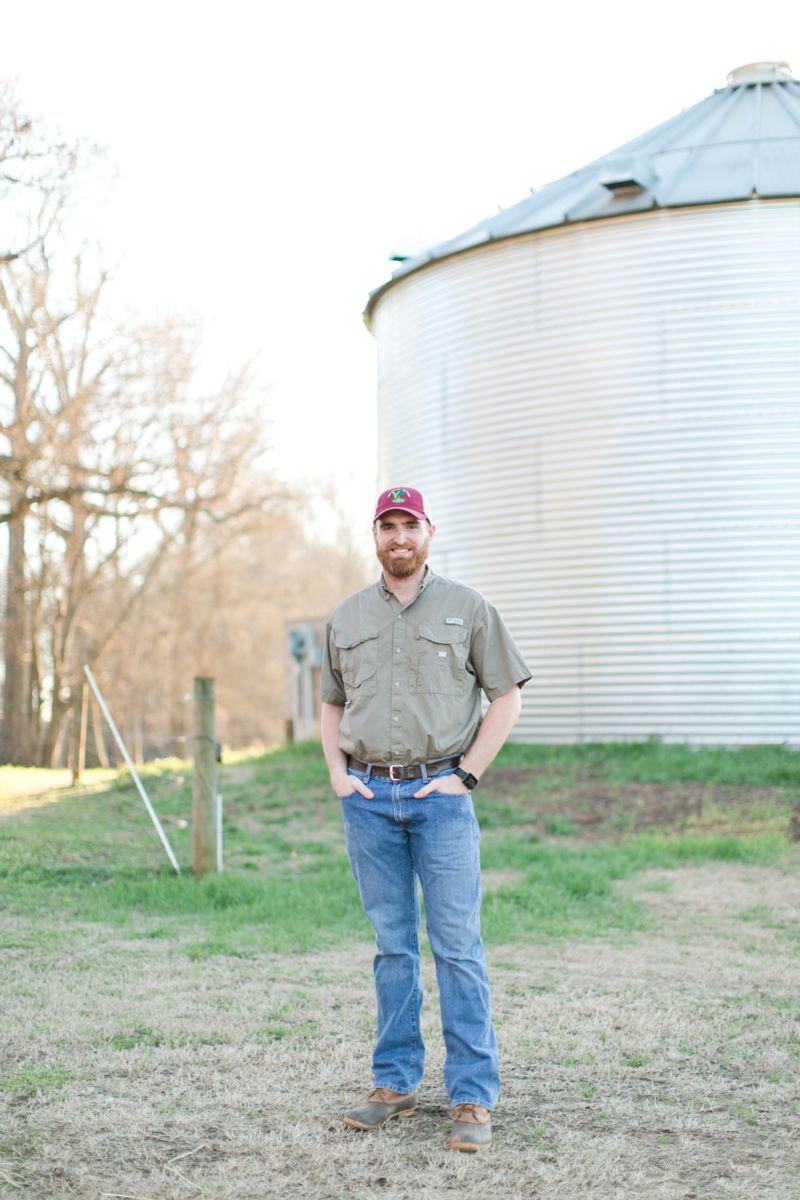
Jesse Patrick partners with his father in a dairy equipment business & farming.
Photo by Sidney Middlebrooks
Patrick found an avenue he hopes will catch on in Georgia to clear the way for farmers to get the land they need. He was approached about a program called the Working Farms Fund (WFF), one of multiple land-use programs operated by The Conservation Fund. WFF purchases farmland identified at risk of being developed. They place it into conservation easements then lease it to young or beginning farmers. Eventually, the farmers have a chance to buy the land at a discounted price.
WHITE: Advocating for Agriculture in the city
Ag teacher Ashley White has a history of competing in dressage and rodeo events.
Photo by Miriam Allen
Having spent much of her life sitting atop a horse, Ashley White is accustomed to an elevated perspective. Being an ag teacher in north Fulton County, part of the United States’ ninth-largest metropolitan area, has given her a unique perspective about agriculture.
“Everyone needs agriculture. It is vital, now more than ever, to educate these people on agriculture and gain their support locally and nationally,” said White, who is president of North Fulton County Farm Bureau. She has actively sought opportunities to share information about agriculture outside the classes she teaches at Cambridge High School in Milton.
In an extensively developed residential and industrial area, where land can cost $100,000 per acre or more, large-scale farming isn’t realistic. White, who grew up on a 150-acre cattle ranch in central Florida, quickly pivoted to a smaller focus.
“The biggest misconception is that agriculture can’t happen in a metropolitan area, or that it doesn’t impact them,” White said. “It can happen as a landscape in your yard or having a garden. No matter where you are, no matter how much property you have, you can still have agriculture in your life at any time.”
That population density may limit the scale of farming in the North Fulton area, but it also creates an opportunity to reach more people with agriculture’s story.
White said her students are the pathway to educating more of the local community about agriculture.
“They’re constantly surprised at the agricultural diversity and everything that goes in it,” White said. “If the kids want to be involved in it, the parents will be involved as well. It’s just an opportunity to educate a lot of people about agriculture.”
Passion for agriculture drives GFB YF&R Achievement families
Nolans win state award
Jacob and Emily Nolan of Wayne County won the 2020 Georgia Farm Bureau Young Farmers & Ranchers Achievement Award. This award recognizes young farmers who derive their income primarily from production agriculture. Applicants are judged on their farming operations, Farm Bureau and other leadership activities.
The Nolans will receive $500 and a farm sign sponsored by AgSouth Farm Credit and a John Deere ATV with trailer sponsored by Southern Farm Bureau Life Insurance as the state winners.
Mathew and Chelsea Bohannon of Stephens County and Steven and Tara Green of Spalding County were finalists for the award. Each couple received $500 sponsored by Farm Credit Associations of Georgia.
Meet these three outstanding farm couples below.
The Nolans – Spring Fever Farms
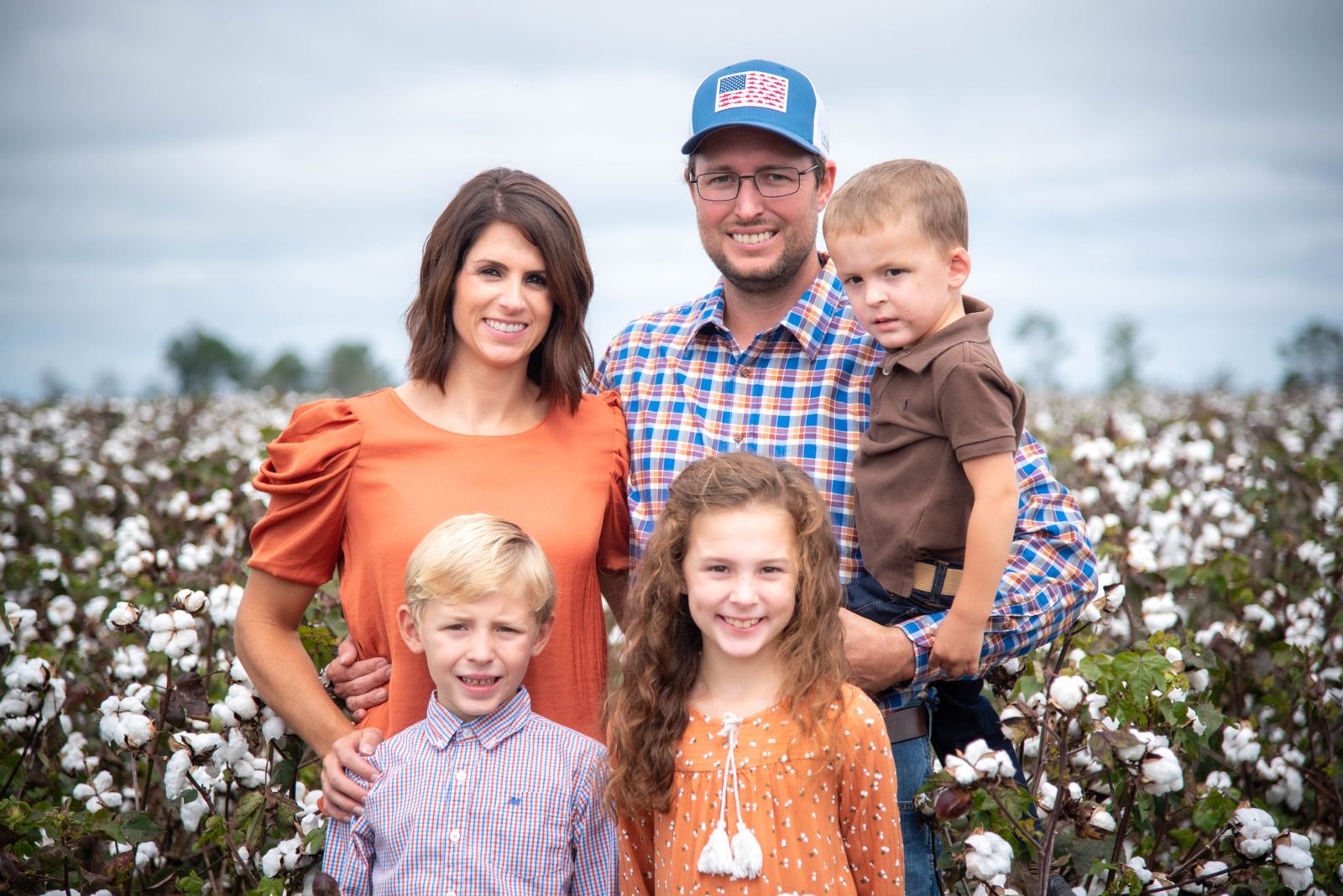
Jacob & Emily Nolan with children Kenley, Reed & Tanner
Photo by Logan Thomas
Jacob and Emily Nolan planted their first cotton crop in 2008. Jacob was pursuing an ag degree at Abraham Baldwin Agricultural School when his dad, Vernon, decided to partially retire. Jacob chose to move back to Wayne County and gradually take over the family farm until his dad completely retired in 2010.
“Dad had started phasing out and didn’t have much equipment. The first two years I rented about half of the farm from him to grow my crops. He grew crops on the other half and hired me to harvest his crops. The third year I began renting and farming all of Dad’s row crop acreage,” Jacob said.
While the Nolans continue to grow cotton and peanuts as their fathers did, over the past 12 years, they’ve gradually diversified into pecans, satsumas and strawberries as they’ve been able to purchase small farms. They’ve diversified into the fruit crops to embrace consumers’ growing demand for locally grown food. They also grow wheat and corn as part of their crop rotation and have a herd of cattle.
The Nolans started their commercial cow-calf herd in 2010 with 18 head when they were able to purchase their first 25 acres. Today, they have 180 head that include 30 purebred Herefords. They plan to grow their herd to 250 head. Using artificial insemination to improve genetics, Jacob wants to phase 50% of their cattle into a F1 Braford herd.
Emily ended her three-year banking career in 2011 to raise their children – Kenley, Reed and Tanner – to handle the farm’s bookwork. She’s also completely responsible for planting, managing and harvesting the farm’s half acre of strawberries of which 0.34 acres are grown in high tunnel greenhouses.
The Nolans are active Wayne County Farm Bureau members. The couple served on the GFB YF&R Committee in 2012-13. Follow their farm on Facebook at Spring Fever Farms.
The Bohannons - B3 Farm
Farming is a dream come true for Matt and Chelsea Bohannon. They began raising cattle in 2016 when they started leasing 53 acres from Chelsea’s grandparents and bought a 10-acre tract next door to her grandparents’ farm. In 2017, they bought two broiler houses and some acreage using family timberland deeded to them as collateral for a loan.
“I grew up around poultry houses my whole life helping my parents as they worked on poultry farms,” Matt said. “I’d always wanted to own my own farm. When a good friend wanted to sell his two, three-year-old houses, it was a good opportunity for us to go for it with the help of family.”
They’ve gradually expanded their farm over the past four years. This year they had the opportunity to buy four more broiler houses from a neighboring farmer. They grow chickens for Columbia Farms.
“They saw how hard Matt worked with our first two houses, so they gave us an amazing deal,” Chelsea said. “Our goal is to eventually build two more houses so I can stay home and work full time with Matt.”
They’ve also increased their commercial cow-calf herd from 10 to 80 head. Their cattle operation consists of two herds: one with Brahman brood cows bred to Angus bulls. Their other herd is more heavily Angus and produces their show calves.
Matt and Chelsea both showed livestock in high school as FFA members. He showed cattle in 9th through 12th grade while Chelsea showed pigs her sophomore and junior years. As a senior she showed the first calf from the first cow that Matt raised.
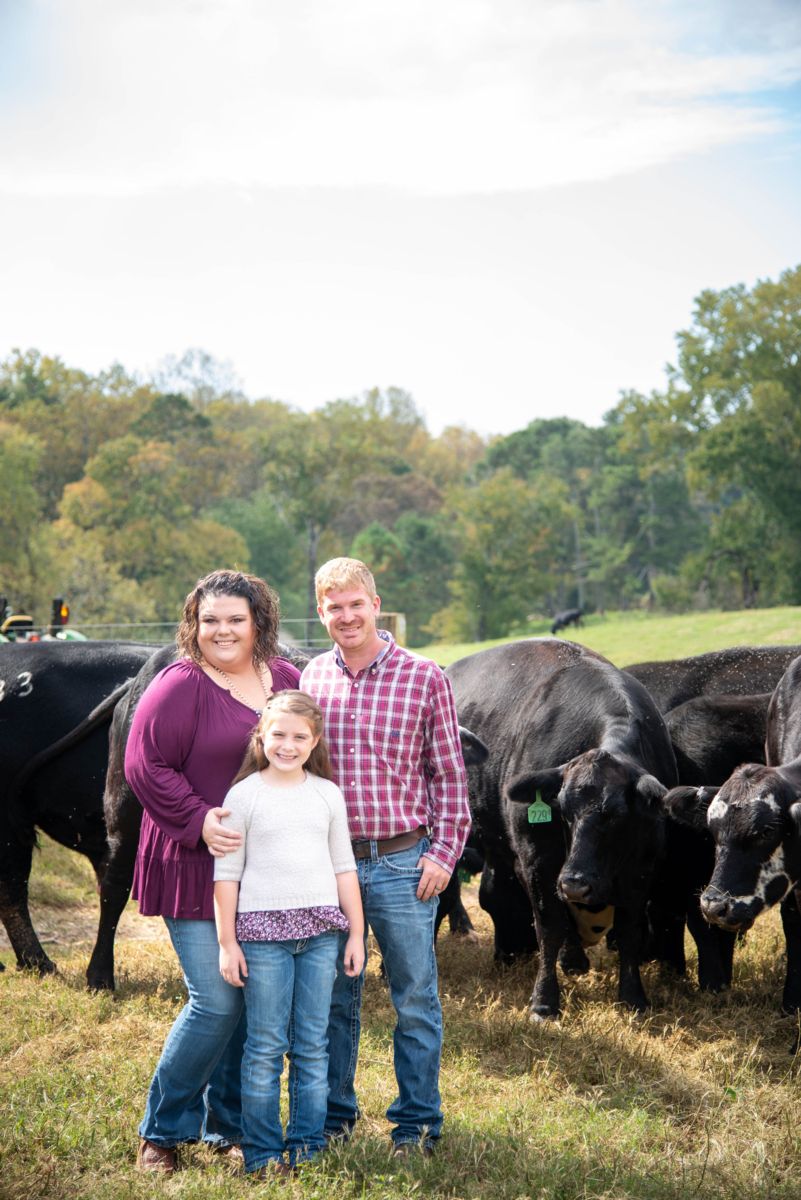
Matt & Chelsea Bohannon with daughter, Baylee.
Photo by Logan Thomas
Today, their daughter, Baylee, shows goats and lambs. The Bohannnons lease and sell cattle and lambs to FFA and 4-H students.
The Bohannons are active Stephens County Farm Bureau members. Chelsea does Ag in the Classroom activities, and Matt helps with FFA events.
Visit www.gfb.ag/20YFRAchievementpics to see more photos from the Nolans’, Bohannons’ & Greens’ farms.
The Greens – Green Gate Farm
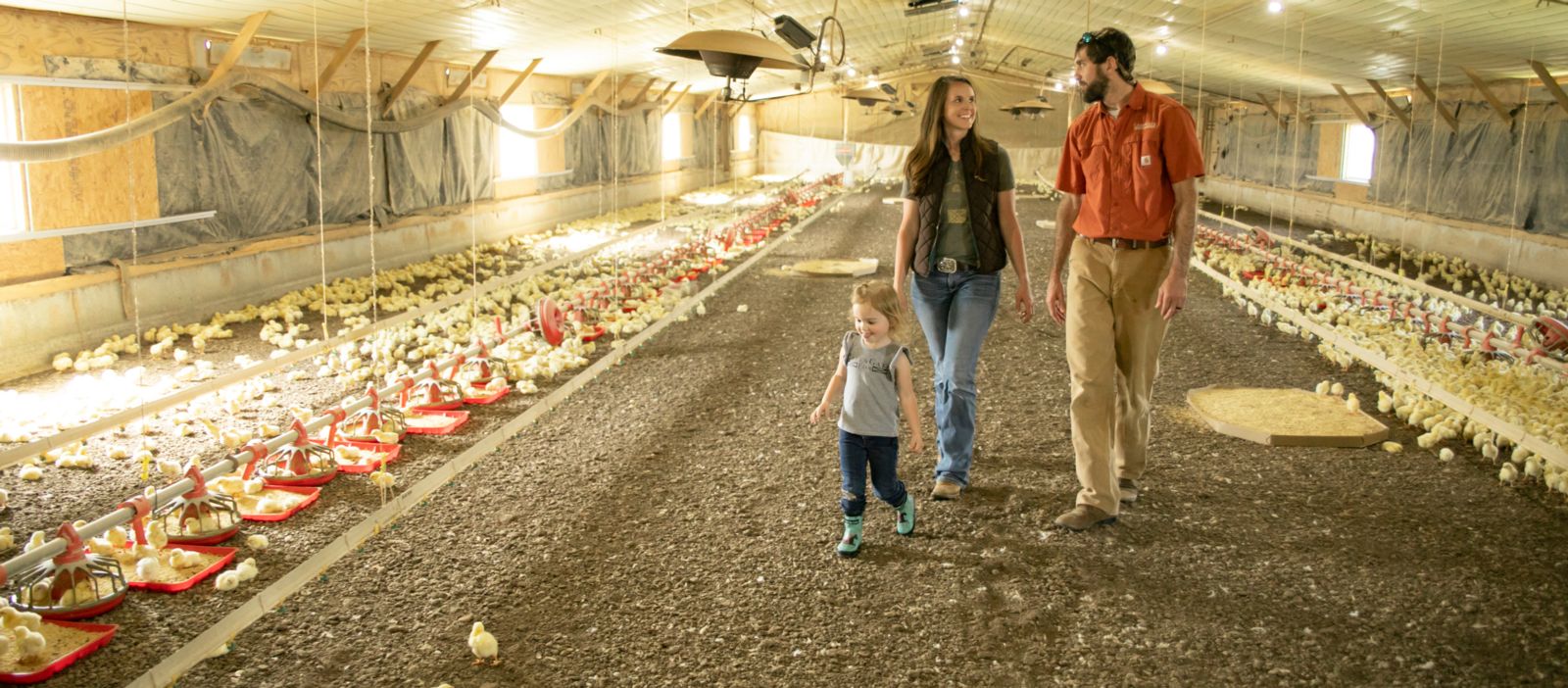
Steven & Tara Green with daughter, Hadley Grace.
Photo by Annie T. Smith
Steven and Tara Green grew up on farms next door to each other. In 2013, they began farming on their own by buying four poultry houses and 70 acres that were part of her grandparents’ farm. Today, their operation includes a commercial cow-calf herd and a litter business. Steven also owns a tree care business.
“We love raising our daughter around agriculture, just as we were, and want her to have all the life lessons she will learn,” Steven said.
The Greens grow broilers for Perdue Farms. The chicken houses were 18 years old when the couple bought their farm, so they’ve repaired feed system pipes inside and out, made major renovations to improve the houses’ energy efficiency, and installed 26 windows per house to meet Perdue’s standards.
The Greens also installed a computer-controlled management system in their houses that allows them to check on their chickens remotely. This doesn’t eliminate the need for the Greens to physically check the chickens throughout the day. It just allows them to check on their chickens remotely. This doesn’t eliminate the need for the Greens to physically check the chickens throughout the day. It just allows them a little more freedom for other farm chores.
While Steven runs the tree service and litter businesses, Tara does the bookwork for all of their businesses. She also maintains their cattle herd along with the herd of Steven’s dad for a total of about 80 head. The two herds of Angus/Brangus/Simangus crosses run together. Her associate degree in veterinary technology has proven useful in doing the many herd health tasks needed.
The Greens are active Spalding County Farm Bureau members. Steven chairs the GFB Poultry Committee. Follow them on Instagram @greengatefarmers_wife or on Facebook at GreenGate Farm.
